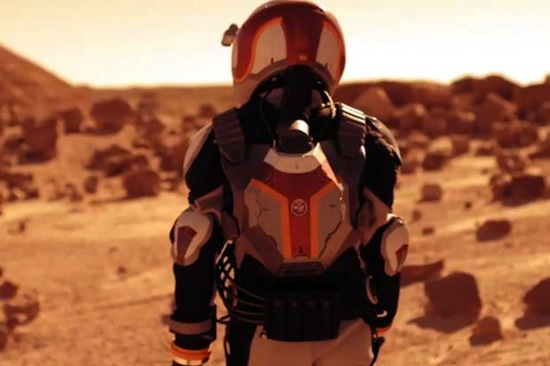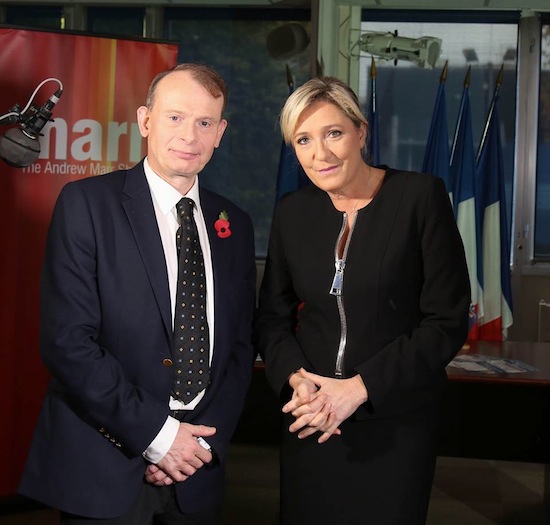There’s been much consternation this week about the BBCs decision to run an interview with French Front National leader Marine Le Pen on Sunday’s Andrew Marr Show.
The argument against giving the "oxygen of publicity" to the far right is always a tricky one to make stand up, though. A cogitation on free speech is a bit outside the scope of this article, so I’ll just make this point: if anyone is concerned about political bias in the media, they’d be wise to not wish for more of it.
Le Pen is in with a serious shot at making it through to the second round run-off in the 2017 French Presidential election, and six months out, she polls strongly against all potential opponents, pulling in around 40% of votes across the board.
There’s plenty of time for the races to narrow, and Le Pen is, frankly, a far less unlikely figure than Donald Trump, that butt of a thousand suddenly unfunny jokes. So whatever one thinks of her politics, she’s hardly a fringe figure who will go away if the news media pretend she’s not there.
So it should be expected that Le Pen would be a high-profile interviewee. The problem, and the danger, is not her being interviewed per se; it’s her being interviewed like this.
The pre-recorded format stinks to high heaven of prepared questions, prepared answers, and Marr, as is his wont, soft-balls the whole thing. He makes one – count em – attempt at a serious challenge, asking Le Pen about her father’s (former party leader Jean-Marie Le Pen) repeated statement over the years that the Nazi gas chambers were "just a detail in the history of World War II".
Le Pen gets to take offence, and – rightly – point out that "I’ve explained myself hundreds of times on this topic; I disagree with my father". And indeed she has, and the party expelled Le Pen snr last year.
Marr, seemingly having reached the extent of his research on the subject, haplessly, hopelessly, asks this same question twice. Le Pen swats it away with ease both times, and he simply moves on.
If he or his team had perhaps cribbed for the exam a little harder, perhaps they’d have thought to ask about the people who are still in the party, such MEP as Bruno Gollnisch, who also doubts the holocaust death count and the existence of the gas chambers. But no – Le Pen’s barely skin-deep detoxification of her party’s image is given an essentially free pass.
Similarly, Marr allows Le Pen to blather on about a supposed opposition to elites without a thing to say about the FN’s economic thinking, a witless, incoherent, say-anything grab bag of neoliberalism and trade protectionism, as one would expect from a party of rich racists pretending to care about the working class.
Next, he sets her up with a question about French relations with Britain post-Brexit, and sits back while she runs through a sales pitch for "multi-polar" nationalism. And then invites her to tell us why Putin is actually really great. And on and on it goes. A high point is when he describes the current political landscape as "this new world of nationalism", effectively conceding the very thing the interview should place into contention.
Marr then concludes with "Brexit – Trump – What’s next?", half way writing a slogan for Le Pen, with which she is visibly delighted.
Less the oxygen of publicity than a hot-air balloon full of Chanel No 5, sent to hover over something that really does smell bad, this is one of the most half-arsed pieces of political interviewing I’ve ever seen. It’s not Marr’s job to argue my corner, or anyone’s, but it is his job to challenge his subjects, and he didn’t do it here.
And this matters. We should make politicians argue their cases in public, and the news media should make it hard for them. I’m all for Le Pen being on TV as much as she likes. But surely it shouldn’t be so readily how she likes.
While discussing this, a friend pointed me to the below video from 1969, of David Frost interviewing Enoch Powell.
Powell gets a full hour, never mind a slot, but it does him no good. Frost slowly dissects him with persistence, command of the facts, and a keen eye for a flawed argument. He doesn’t take an oppositional stance; he just finds and exposes the holes, contradictions, hypocrisies and lies in Powell’s ideology. If The Andrew Marr Show can’t come up to this standard, it ought to leave the big stuff to someone else.
Living in such anti-progressive times, National Geographic’s docu-drama serial Mars, feels, despite its glorious production values, like something from the mid-70s. Alongside the fictional content – a hypothetical manned mission in 2033 – the show features a huge amount of interview footage with people like SpaceX boss Elon Musk and NASA adminstrator Charles Boden – real life players in active Mars projects.
The 2033 sections are gripping, and highlight how dangerous and difficult such a mission will be, but it’s the 2016 material that lingers in the mind. There are a range of perspectives, including from the worlds of economics and politics, and Neil deGrasse Tyson and sci fi novelist Andy Weir show up to provide some pop-philosophy. And while there’s much talk of the scale of the challenge, there whole thing is held together by a huge sense of optimism, that humankind can still pull off feats like these. I’m not quite sure I share this feeling, right now, but I’m glad Mars is going to try to sell me on it for the next six weeks.

National Geographic Channel
While American Horror Story has always enjoyed the occasional wink at the fourth wall, season six takes an axe to it, and messing with the audience has been the core element. The first five episodes are presented as a docudrama, My Roanoke Nightmare, with survivors of a haunting commenting as talking heads over re-enactment footage performed by actors. So we have Lily Rabe playing Shelby, a warm-hearted Californian, but we also have Sarah Paulson playing Audrey Tindall, a snooty, narcissitic English actor, playing Shelby, but "angry and pathetic" as Audrey interprets her.
These layers are mostly hidden until episode six, save for a very brief moment of backstage footage early on. In a brilliant narrative move, when My Roanoke Nightmare wraps up, it wraps up completely, no cliffhanger, seemingly no story left to tell. Which is when things get really odd. Episode six kicks off as a completely different show, Return to Roanoke: Three Days in Hell, a Big Brother-style reality show, with the protagonists and the actors who played them all staying together in the supposedly haunted house.

Reality TV spoofs, found footage, shows within shows; none of this is new, but I can’t recall having seen it all smashed together with such brio before. The second half opens with a title card telling us that all but one character will die, and this claim that genre conventions will be followed made me laugh out loud; they are, but in the most head-twisting way possible.
The finale episode airs this week, and show runner Ryan Murphy has promised that the final episode is yet another shake up of the format, so who knows where it’s all headed.
The show overall has dialled back on its campness, which is something of a shame, and I definitely miss departed series regular Jessica Lange’s big gun performances. On the other hand, Sarah Paulson has truly owned this season, showing off superb comedy skills that the series has not exploited before.
As is usual with AHS, despite being generally absurd, playing a lot of stuff for laughs, and working its guest stars and returning cast as shamelessly as a pantomime, the horror is entirely effective, pin-balling from one jump scare to the next, dragging bloodied guts in its wake. Quite possibly their best season to date.



